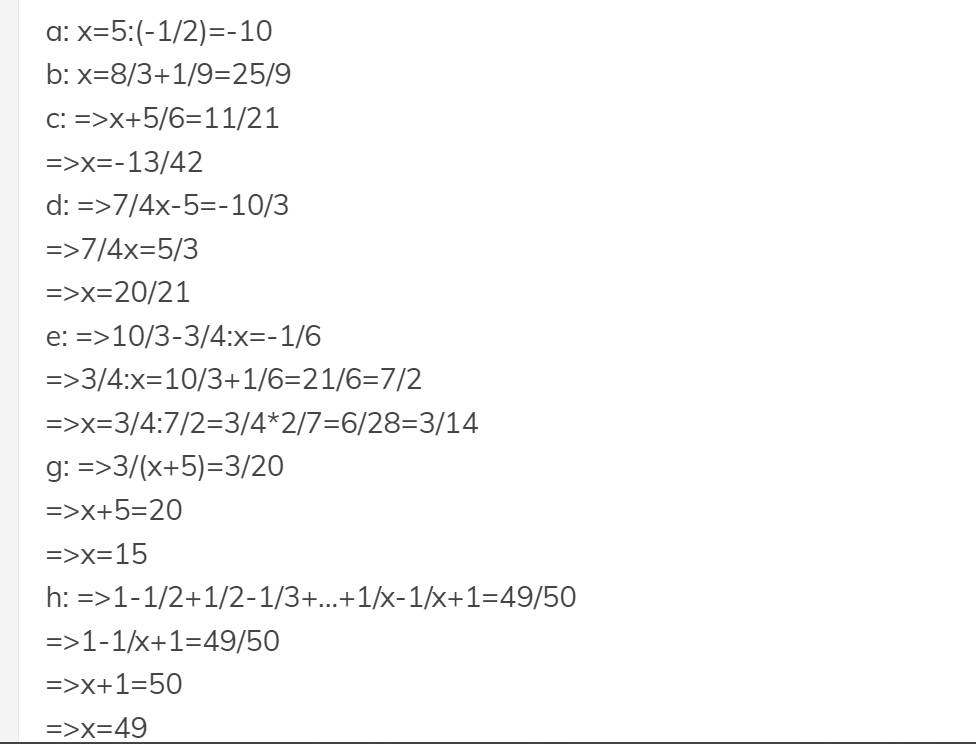Hãy nhập câu hỏi của bạn vào đây, nếu là tài khoản VIP, bạn sẽ được ưu tiên trả lời.

Giải:
a) \(\dfrac{-5}{8}=\dfrac{x}{16}\)
\(\Rightarrow x=\dfrac{16.-5}{8}=-10\)
\(\dfrac{3x}{9}=\dfrac{2}{6}\)
\(\Rightarrow3x=\dfrac{2.9}{6}=3\)
\(\Rightarrow x=1\)
b) \(\dfrac{x+3}{15}=\dfrac{1}{3}\)
\(\Rightarrow x+3=\dfrac{1.15}{3}=5\)
\(\Rightarrow x=2\)
\(\dfrac{6}{2x+1}=\dfrac{2}{7}\)
\(\Rightarrow2x+1=\dfrac{6.7}{2}=21\)
\(\Rightarrow x=10\)
c) \(\dfrac{4}{x-6}=\dfrac{y}{24}=\dfrac{-12}{18}\)
\(\Rightarrow\dfrac{4}{x-6}=\dfrac{-12}{18}\)
\(\Rightarrow x-6=\dfrac{18.4}{-12}=-6\)
\(\Rightarrow x=0\)
\(\Rightarrow\dfrac{y}{24}=\dfrac{-12}{18}\)
\(\Rightarrow y=\dfrac{-12.24}{18}=-16\)
\(\dfrac{3-x}{-12}=\dfrac{16}{y+1}=\dfrac{192}{-72}\)
\(\Rightarrow\dfrac{3-x}{-12}=\dfrac{192}{-72}\)
\(\Rightarrow3-x=\dfrac{192.-12}{-72}=32\)
\(\Rightarrow x=-29\)
\(\Rightarrow\dfrac{16}{y+1}=\dfrac{192}{-72}\)
\(\Rightarrow y+1=\dfrac{16.-72}{192}=-6\)
d) \(\dfrac{-2}{3}< \dfrac{x}{5}< \dfrac{-1}{6}\)
\(\Rightarrow\dfrac{-20}{30}< \dfrac{6x}{30}< \dfrac{-5}{30}\)
\(\Rightarrow6x\in\left\{-18;-12;-6\right\}\)
\(\Rightarrow x\in\left\{-3;-2;-1\right\}\)
\(\dfrac{-1}{5}\le\dfrac{x}{8}\le\dfrac{1}{4}\)
\(\Rightarrow\dfrac{-8}{40}\le\dfrac{5x}{40}\le\dfrac{10}{40}\)
\(\Rightarrow5x\in\left\{-5;0;5;10\right\}\)
\(\Rightarrow x\in\left\{-1;0;1;2\right\}\)
e) \(\dfrac{x+46}{20}=x\dfrac{2}{5}\)
\(\Rightarrow\dfrac{x+46}{20}=x+\dfrac{2}{5}\)
\(\Rightarrow\dfrac{x+46}{20}=\dfrac{5x+2}{5}\)
\(\Rightarrow5.\left(x+46\right)=20.\left(5x+2\right)\)
\(\Rightarrow5x+230=100x+40\)
\(\Rightarrow5x-100x=40-230\)
\(\Rightarrow-95x=-190\)
\(\Rightarrow x=-190:-95\)
\(\Rightarrow x=2\)
\(y\dfrac{5}{y}=\dfrac{86}{y}\)
\(\Rightarrow y+\dfrac{5}{y}=\dfrac{86}{y}\)
\(\Rightarrow\dfrac{y^2+5}{y}=\dfrac{86}{y}\)
\(\Rightarrow y^2+5=86\)
\(\Rightarrow y^2=86-5\)
\(\Rightarrow y^2=81\)
\(\Rightarrow\left[{}\begin{matrix}y=9\\y=-9\end{matrix}\right.\)
Chúc bạn học tốt!

Bài 1:
A = 3(x + 1)2 + 5
Ta có: (x + 1)2 \(\ge\) 0 Với mọi x
\(\Rightarrow\) 3(x + 1)2 \(\ge\) 0 với mọi x
\(\Rightarrow\) 3(x + 1)2 + 5 \(\ge\) 5 với mọi x
Hay A \(\ge\) 5
Dấu "=" xảy ra khi và chỉ khi x + 1 = 5 hay x = -1
Vậy...
B = 2|x + y| + 3x2 - 10
Ta có: 2|x + y| \(\ge\) 0 với mọi x, y
3x2 \(\ge\) 0 với mọi x
\(\Rightarrow\) 2|x + y| + 3x2 - 10 \(\ge\) -10 với mọi x,y
Dấu "=" xảy ra khi và chỉ khi x + y = 0; x = 0
\(\Rightarrow\) x = y = 0
Vậy ...
C = 12(x - y)2 + x2 - 6
Ta có: 12(x - y)2 \(\ge\) 0 với mọi x; y
x2 \(\ge\) 0 với mọi x
\(\Rightarrow\) 12(x - y)2 + x2 - 6 \(\ge\) -6 với mọi x, y
Dấu "=" xảy ra khi và chỉ khi x = y = 0
Phần D ko rõ đầu bài nha vì D luôn có một giá trị duy nhất
Bài 2:
Phần A ko rõ đầu bài!
B = 3 - (x + 1)2 - 3(x + 2y)2
Ta có: -(x + 1)2 \(\le\) 0 với mọi x
-3(x + 2y)2 \(\le\) 0 với mọi x, y
\(\Rightarrow\) 3 - (x + 1)2 - 3(x + 2y)2 \(\le\) 3 với mọi x, y
Dấu "=" xảy ra khi và chỉ khi x = 2y; x + 1 = 0
\(\Rightarrow\) x = -1; y = \(\dfrac{-1}{2}\)
Vậy ...
C = -12 - 3|x + 1| - 2(y - 1)2
Ta có: -3|x + 1| \(\le\) 0 với mọi x
-2(y - 1)2 \(\le\) 0 với mọi y
\(\Rightarrow\) -12 - 3|x + 1| - 2(y - 1)2 \(\le\) -12 với mọi x, y
Dấu "=" xảy ra khi và chỉ khi x + 1 = 0; y - 1 = 0
\(\Rightarrow\) x = -1; y = 1
Vậy ...
Phần D đề ko rõ là \(\dfrac{5}{2x^2}-3\) hay \(\dfrac{5}{2}\)x2 - 3 nữa
F = \(\dfrac{-5}{3}\) - 2x2
Ta có: -2x2 \(\le\) 0 với mọi x
\(\Rightarrow\) \(\dfrac{-5}{3}-2x^2\) \(\le\) \(\dfrac{-5}{3}\) với mọi x
Dấu "=" xảy ra khi và chỉ khi x = 0
Vậy ...
Chúc bn học tốt!

\(a,\dfrac{-1}{8}=\dfrac{3}{x}\\ \dfrac{3}{-24}=\dfrac{3}{x}\\ x=-24\\ b,\dfrac{x}{3}=\dfrac{3}{x}\\ x.x=3.3\\ x^2=9\\ x=\pm3\\ c,\dfrac{3}{4}.x=1\dfrac{1}{2}\\ \dfrac{3}{4}.x=\dfrac{3}{2}\\ x=\dfrac{3}{2}:\dfrac{3}{4}\\ x=2\\ d,x-\dfrac{3}{10}=\dfrac{7}{15}:\dfrac{3}{5}\\ x-\dfrac{3}{10}=\dfrac{7}{9}\\ x=\dfrac{7}{9}+\dfrac{3}{10}\\ x=\dfrac{97}{90}\\ e,\dfrac{-4}{7}-x=\dfrac{-8}{3}.\dfrac{3}{7}\\ \dfrac{-4}{7}-x=\dfrac{-8}{7}\\ x=\dfrac{-4}{7}+\dfrac{8}{7}\\ x=\dfrac{4}{7}\\ \)

a: x=5:(-1/2)=-10
b: x=8/3+1/9=25/9
c: =>x+5/6=11/21
=>x=-13/42
d: =>7/4x-5=-10/3
=>7/4x=5/3
=>x=20/21
e: =>10/3-3/4:x=-1/6
=>3/4:x=10/3+1/6=21/6=7/2
=>x=3/4:7/2=3/4*2/7=6/28=3/14
g: =>3/(x+5)=3/20
=>x+5=20
=>x=15
h: =>1-1/2+1/2-1/3+...+1/x-1/x+1=49/50
=>1-1/x+1=49/50
=>x+1=50
=>x=49
Tìm x
a) 4/5 ( x - 1/3) - \(3\dfrac{1}{2}\)= 50%
b) \(8\dfrac{3}{5}\cdot x-2\dfrac{1}{5}\cdot x=16\%\)

a) \(\dfrac{4}{5}\left(x-\dfrac{1}{3}\right)-3\dfrac{1}{2}=50\%\)
\(\dfrac{4}{5}x-\dfrac{4}{15}-\dfrac{7}{2}=\dfrac{1}{2}\)
\(\dfrac{4}{5}x=\dfrac{1}{2}+\dfrac{7}{2}+\dfrac{4}{15}\)
\(\dfrac{4}{5}x=\dfrac{64}{15}\)
\(x=\dfrac{64}{15}:\dfrac{4}{5}\\ x=\dfrac{16}{3}\)
b) \(8\dfrac{3}{5}.x-2\dfrac{1}{5}.x=16\%\)
\(\dfrac{43}{5}x-\dfrac{11}{5}x=\dfrac{4}{25}\)
\(\dfrac{32}{5}x=\dfrac{4}{25}\)
\(x=\dfrac{4}{25}:\dfrac{32}{5}\)
\(x=\dfrac{1}{40}\)

\(x\div4\frac{1}{3}=-2,5\)
\(\Leftrightarrow x\div\frac{13}{3}=\frac{-5}{2}\)
\(\Leftrightarrow x=\frac{-5}{2}.\frac{13}{3}\)
\(\Leftrightarrow x=\frac{-65}{6}\)
\(x\div\frac{-3}{5}=\frac{-10}{21}\)
\(\Leftrightarrow x=\frac{-10}{21}.\frac{-3}{5}\)
\(\Leftrightarrow x=\frac{30}{105}\)
\(\Leftrightarrow x=\frac{2}{7}\)
\(\frac{2}{3}x-\frac{1}{2}=\frac{1}{10}\)
\(\Leftrightarrow\frac{2}{3}x=\frac{1}{10}+\frac{1}{2}\)
\(\Leftrightarrow\frac{2}{3}x=\frac{6}{10}\)
\(\Leftrightarrow x=\frac{6}{10}\div\frac{2}{3}\)
\(\Leftrightarrow x=\frac{18}{20}\)
\(\Leftrightarrow x=\frac{9}{10}\)
\(\frac{1}{2}x+\frac{1}{2}=\frac{5}{2}\)
\(\Leftrightarrow\frac{1}{2}\left(x+1\right)=\frac{5}{2}\)
\(\Leftrightarrow\left(x+1\right)=\frac{5}{2}\div\frac{1}{2}\)
\(\Leftrightarrow\left(x+1\right)=5\)
\(\Leftrightarrow x=5-1\)
\(\Leftrightarrow x=4\)

a) 64 * 4^x = 16^8
4^x = 16^8 : 64
4^x = 2^32 : 2^6
4^x = 2^26
4^x = (2^2)13
4^x = 4^13
=> x= 13
b) (2x+1)^3 = 5^3
=> 2x+1 = 5
2x = 4
x= 2
c) (x-5)^4 =(x-5)^6
d) (x-1)^x+2 = (x-1)^x+4
(x-1)^x * (x-1)^2 = (x-1)^x * (x-1)^4
(x-1)^x = (x-1)^4 :(x-2)^2
(x-1)^x = (x-2)^2
=> x=2
bạn giúp mình giải luôn bài 1 tính đc hông zợ ???